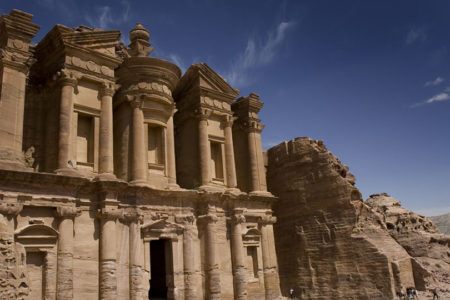The Love and Mercy of God Part One
The key Old Testament word for God’s mercy is hesed. Scholars have translated it frequently as “mercy” or “lovingkindness.”
Hesed appears 245 times within 27 books of the Old Testament,1 indicating that mercy or lovingkindness (for brevity, I will usually refer to it as mercy) is a significant attribute of God.
The Relationship of God’s Love to His Mercy
The Bible reveals that God’s love prompts His mercy. God said the following concerning Israel: “I have loved you with an everlasting love; therefore with lovingkindness I have drawn you” (Jer. 31:3). The word translated “lovingkindness” is hesed.
God’s mighty deliverance of the Israelites from their prolonged slavery in Egypt was an example of His mercy. Moses told them God’s love for them prompted His mercy on their behalf.
The Lᴏʀᴅ did not set His love on you nor choose you because you were more in number than any other people, for you were the least of all peoples; but because the Lᴏʀᴅ loves you, and because He would keep the oath which He swore to your fathers, the Lᴏʀᴅ has brought you out with a mighty hand, and redeemed you from the house of bondage, from the hand of Pharaoh king of Egypt (Dt. 7:7–8).
Consequently, Old Testament scholar Gerhard Wallis wrote, “The deeds Yahweh does in behalf of his people are to be explained out of his love for them.”2
The Relationship of God’s Covenant Commitment to His Mercy
Deuteronomy 7:7–8 indicates that God’s love for the people of Israel was not the only reason for His mercy toward them: He was committed to keeping the oath He had sworn to their ancestors, Abraham, Isaac, and Jacob. Exodus 32:13 sheds light on that divine oath:
Remember Abraham, Isaac, and Israel, Your servants, to whom You swore by Your own self, and said to them, “I will multiply your descendants as the stars of heaven; and all this land that I have spoken of I give to your descendants, and they shall inherit it forever.”
In that statement Moses referred to the promises that constituted the Abrahamic Covenant that God established forever and exclusively with Abraham, Isaac, Jacob, and the people of Israel. The following passages also record these promises:
Genesis 15:5. God told Abraham, “Look now toward heaven, and count the stars if you are able to number them.” Then He said to him, “So shall your descendants be.”
Genesis 15:18. “On the same day the Lᴏʀᴅ made a covenant with Abram, saying: ‘To your descendants I have given this land, from the river of Egypt to the great river, the River Euphrates.’”
Genesis 17:7–8. “And I will establish My covenant between Me and you [Abraham] and your descendants after you in their generations, for an everlasting covenant, to be God to you and your descendants after you. Also I give to you and your descendants after you the land in which you are a stranger, all the land of Canaan, as an everlasting possession; and I will be their God.”
Genesis 17:19–21. After Abraham fathered a son named Ishmael, God declared the following: “Sarah your wife shall bear you a son, and you shall call his name Isaac; I will establish My covenant with him for an everlasting covenant, and with his descendants after him. And as for Ishmael, I have heard you. Behold, I have blessed him, and will make him fruitful, and will multiply him exceedingly. He shall beget twelve princes, and I will make him a great nation. But My covenant I will establish with Isaac, whom Sarah shall bear to you at this set time next year.”
Genesis 28:13–14. Years later God promised Jacob, one of Isaac’s sons, “I am the Lᴏʀᴅ God of Abraham your father and the God of Isaac; the land on which you lie I will give to you and your descendants. Also your descendants shall be as the dust of the earth; you shall spread abroad to the west and the east, to the north and the south; and in you and in your seed all the families of the earth shall be blessed.”
Genesis 35:10, 12. “Your name is Jacob; your name shall not be called Jacob anymore, but Israel shall be your name. The land which I gave Abraham and Isaac I give to you; and to your descendants after you I give this land.”
In Exodus 32:13 Moses indicated that God swore these promises into effect by His “own self.” Many centuries later, the writer of the book of Hebrews referred to this significant fact: “For when God made a promise to Abraham, because He could swear by no one greater, He swore by Himself, saying, ‘Surely blessing I will bless you, and multiplying I will multiply you’” (Heb. 6:13–14). He also explained the significance of God’s action: “For men indeed swear by the greater, and an oath for confirmation is for them an end of all dispute. Thus God, determining to show more abundantly to the heirs of promise the immutability of His counsel, confirmed it by an oath” (vv. 16–17).
This was God’s way of guaranteeing His irrevocable commitment to keeping His promises that constituted the covenant He established with Abraham, Isaac, Jacob, and the nation of Israel forever.
Since that commitment was another reason for God’s mercy toward the people of Israel, it indicated that His attribute of lovingkindness would always be available to them.
Thus, when God’s Son was about to be born as the Messiah many centuries after Moses’ statement in Deuteronomy 7:7–8, something significant happened to Zacharias, the father of John the Baptist:
Zacharias was filled with the Holy Spirit, and prophesied, saying: “Blessed is the Lord God of Israel, for He has visited and redeemed His people, and has raised up a horn of salvation for us in the house of His servant David, as He spoke by the mouth of His holy prophets, who have been since the world began, that we should be saved from our enemies and from the hand of all who hate us, to perform the mercy promised to our fathers and to remember His holy covenant, the oath which He swore to our father Abraham” (Lk. 1:67–73).
Zacharias’s Holy Spirit-prompted prophecy associated God’s mercy with the covenant God swore into effect with Abraham.
In light of the fact that God’s mercy for the people of Israel is the result of His love for them and His commitment to keeping the covenant that He swore into effect with their ancestors, Old Testament scholar D. N. Freedman correctly stated, “The word hesed is a covenant term most often meaning ‘covenant love.’…A relationship built on hesed is meant to be long-term. Hesed should be kept.”3
Three Principles Involved in Mercy
Old Testament scholar H. J. Zobel presented three aspects or principles involved in mercy or lovingkindness:
(1) It involves action that is prompted by an attitude. It is an act that protects or improves life; that alleviates suffering, calamity, loss, disappointment, and sorrow.4
God’s attitudes that prompted His merciful actions for the Israelites were His love for them and His commitment to keep the covenant that He swore into effect with their ancestors.
(2) It always involves interpersonal relationships.5
Moses indicated that God established a unique, interpersonal relationship with the people of Israel: “For you are a holy people to the Lᴏʀᴅ your God; the Lᴏʀᴅ your God has chosen you to be a people for Himself, a special treasure above all the peoples on the face of the earth” (Dt. 7:6).
(3) It must endure and be reliable throughout time for the sake of a tolerable interpersonal relationship.6
King David wrote, “Who is like Your people, like Israel, the one nation on the earth whom God went to redeem for Himself as a people….You have made Your people Israel Your very own people forever; and You, Lᴏʀᴅ, have become their God” (2 Sam. 7:23–24).
Because God’s mercy toward the people of Israel involves His commitment to keep His covenant with them, and because He established that covenant forever, He will never allow Israel to be annihilated. There will always be Jewish people to experience His mercy or lovingkindness.
God has promised that, despite Israel’s sins, it will never be destroyed.
In Deuteronomy 4:30–31, Moses told the Israelites,
When you are in distress, and all these things come upon you in the latter days, when you turn to the Lᴏʀᴅ your God and obey His voice (for the Lᴏʀᴅ your God is a merciful God), He will not forsake you nor destroy you, nor forget the covenant of your fathers which He swore to them.
In Jeremiah 30:11 God said, “‘I am with you,’ says the Lᴏʀᴅ, ‘to save you; though I make a full end of all nations where I have scattered you, yet I will not make a complete end of you. But I will correct you in justice, and will not let you go altogether unpunished.’”
The apostle Paul told the Gentiles, “Concerning the gospel they [the people of Israel] are enemies for your sake, but concerning the election they are beloved for the sake of the fathers. For the gifts and the calling of God are irrevocable” (Rom. 11:28–29).
ENDNOTES
- H. J. Zobel, “hesed,” Theological Dictionary of the Old Testament (hereafter cited as TDOT), ed. G. Johannes Botterweck and Helmer Ringgren, trans. David E. Green, translated from Theologisches Worterbuch zum Alten Testament (Grand Rapids, MI: Eerdmans, 1986), 5:45.
- Gerhard Wallis, “ababh,” TDOT, ed. G. Johannes Botterweck and Helmer Ringgren, trans. John T. Willis (Grand Rapids, MI: Eerdmans, 1974), 1:106.
- D. N. Freedman and J. R. Lundbom, “hanan,” TDOT, ed. G. Johannes Botterweck and Helmer Ringgren, trans. David E. Green (Grand Rapids, MI: Eerdmans, 1986), 5:25.
- H. J. Zobel, TDOT, 5:51.
- Ibid.
- Ibid.






